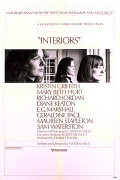
Directed by
Woody Allen
93 minutes
Rated M
Reviewed by
Bernard Hemingway

Interiors
Woody Allen’s comedies are much loved because of their delightfully parodic take on the human capacity for angst-ridden alienation. Here, coming on the heels of his huge success the previous year with Annie Hall he eschews the comedy and goes straight for the angst in a film that is evidently indebted to Ingmar Bergman, one of Allen’s cinematic reference points. The result is awful.
If the muted beige-coffee coloured tonalities of the art direction (Joel Schumacher is credited with costumes design) and pallid-looking Northern European looking cast are a deadly dull combination the seat of the problem is Allen’s expositional script which purports to take seriously the very things that he has made his career wittily mocking – the longueurs of liberal middle class New Yorkers with their artistic and intellectual pretensions.
Geraldine Page, looking like some evil Calvinistic grandmother, plays Eve the neurotic interior designer wife of Arthur (E.G. Marshall) and mother to adult daughters Renata (Diane Keaton), Joey (Mary Beth Hurt) and Flyn (Kristin Griffith). Renata, a poet, is married to a dissatisfied writer and academic (Richard Jordan) whilst Joey is married to a smug film-maker (or perhaps it was just Sam Waterston being typically smug). At least I think that is what he was supposed to be but it doesn’t really matter as the point is that they are all “creatives” with an appreciation of the finer things of life.
Allen loads the script with earnest exchanges on art and life and so on that are embarrassing in their triteness (at one point, amidst a dinner party, the conversation turns to the subject of Death and Renata opines that if you read “Socrates, Buddha, Schopenhauer or even Ecclesiastes, you find them pretty convincing on the subject” (sic) - a glib assortment of references that typifies Allen’s cherry-picking use of iconic signifiers, something that works in his comedies but fails in a straight dramatic setting such as this whe nthey are actually supposed to make sense).
The meat of the drama however is everyone self-flagellating or venting their angst on each other in turgidly-written sibling rivalries, marital spats and parent-child confrontations, Allen throwing all this into relief by having Arthur turning up with an obvious antiphon to thechorus of misery - a cheery “vulgarian” Pearl (Maureen Stapleton) with whom he is determined to take a final swing at happiness. This, of course, is too much for Eve who promptly throws herself in the wintry briny just to spite him on his wedding day. Sheesh!
While some credit should go to Allen for trying, the simple fact of the matter is that he is not Bergman and he is out of his depth with this material. Comedy or, even better, dramedy, is his métier and in this he has a peerless ability to toss off witty insights into the foibles of a certain class. You can see the difference with Hannah and her Sisters (1986) in which Allen took a thematically-related scenario and got it to work.
Want something different?





